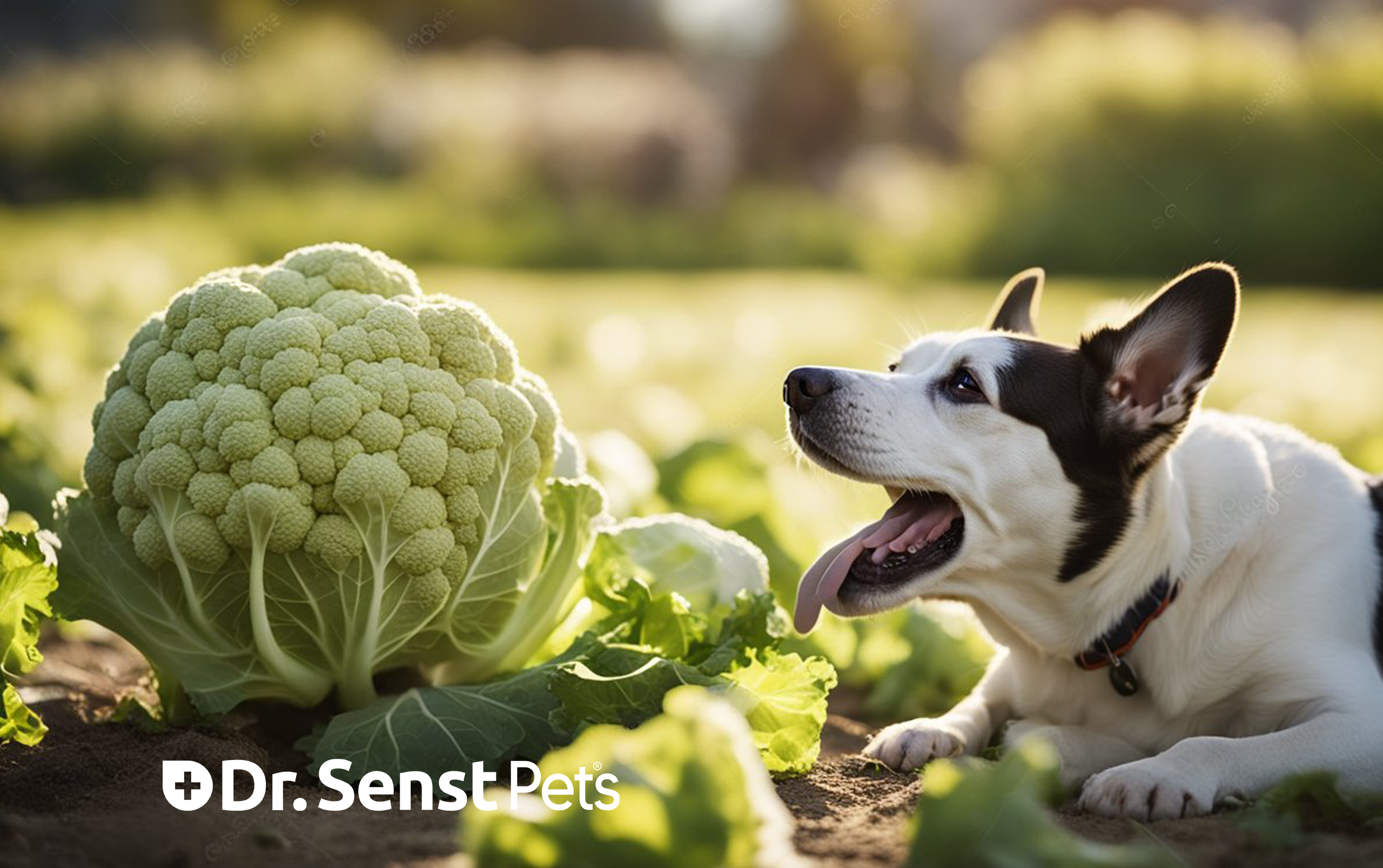
- by Dr.Thilo Senst
Can Dogs Eat Cauliflower? Benefits, Tips, and Health Insights
- by Dr.Thilo Senst
Cauliflower is packed with nutrients, making it a healthy choice for dogs in moderation. Some of the key nutritional benefits include:
Rich in Fibre: Cauliflower is a great source of dietary fibre, which can support your dog’s digestive health and prevent constipation.
Low in Calories: If your dog is on a weight management plan, cauliflower is a low-calorie option that can be used as a snack or an addition to meals.
High in Antioxidants: Antioxidants in cauliflower help neutralise harmful free radicals in the body, promoting a healthy immune system and potentially reducing inflammation.
Rich in Vitamins: Cauliflower contains essential vitamins such as vitamin C, K, and B6, which contribute to a dog’s overall health by supporting the immune system, promoting healthy bones, and aiding in energy metabolism.
According to the British Veterinary Association, approximately 40% of dogs in the UK are considered overweight, which is why incorporating low-calorie vegetables like cauliflower can be beneficial for weight control.
While cauliflower is safe for dogs, it should only be offered in moderation. Large quantities can lead to digestive discomfort due to its fibre content, potentially causing gas or an upset stomach.
The best way to serve cauliflower to your dog is by:
It’s important to remember that while cauliflower is nutritious, it should never replace a well-balanced dog food diet. Dogs require a complete mix of protein, fats, and other essential nutrients that cauliflower alone cannot provide.
Think of cauliflower as a healthy snack for your dog, much like how humans might enjoy carrot sticks between meals. While nutritious, it’s not a replacement for a full meal.
Do:
Don’t:
Cauliflower can offer several health benefits when incorporated into your dog’s diet in moderation:
Weight Management: Because of its low-calorie content, cauliflower can be a great snack for dogs who need to manage their weight without sacrificing nutrition.
Boosts Digestion: The high fibre content in cauliflower supports regular bowel movements, making it beneficial for dogs prone to constipation.
Improved Immune Function: With a boost of vitamins and antioxidants, cauliflower can help improve your dog’s immune response, reducing the chances of infections and illnesses.
Anti-inflammatory Properties: The antioxidants in cauliflower have been shown to have anti-inflammatory effects, which may help alleviate pain from conditions such as arthritis.
While cauliflower can be a healthy addition to a dog's diet, there are some risks to be aware of:
Gastrointestinal Upset: Too much cauliflower can lead to gas, bloating, and diarrhoea. It’s essential to feed it in moderation, especially if your dog has a sensitive stomach.
Choking Hazard: Large, raw pieces of cauliflower can be difficult for dogs to chew, especially for smaller breeds. Always cut cauliflower into bite-sized pieces and ensure it's cooked soft.
Thyroid Function: Cauliflower, along with other cruciferous vegetables, contains goitrogens that can interfere with thyroid function when consumed in very large quantities. This is generally not a concern when fed in moderation, but it's important to avoid overfeeding.
Start Small: Introduce small portions of cooked cauliflower and monitor how your dog reacts. If there’s no digestive upset, you can gradually increase the serving size.
Pair with Protein: Cauliflower can be mixed with your dog’s regular meals as an added vegetable. Pair it with high-protein dog food for a balanced meal.
Use as a Treat: Instead of giving processed treats, consider using cauliflower bites as a low-calorie, healthy alternative during training sessions.
Monitor Digestive Health: Pay attention to your dog’s bowel movements after feeding them cauliflower. If you notice any signs of an upset stomach, reduce the amount or discontinue feeding it.
In a survey by PDSA, it was found that 49% of UK dog owners are not sure which human foods are safe for their dogs. Cauliflower, when prepared properly, is one such food that can be safely included in a dog's diet.
1. Is raw cauliflower safe for dogs?
Yes, but it’s best to feed cooked cauliflower to make it easier for dogs to digest. Raw cauliflower in large quantities can lead to gas and bloating.
2. How often can I give my dog cauliflower?
Cauliflower should be given occasionally as a treat or supplement to their diet. It’s not a staple food but can be offered a few times a week in small portions.
3. What are the signs that my dog is having trouble digesting cauliflower?
If your dog experiences gas, bloating, or diarrhoea after eating cauliflower, it may indicate that they are having trouble digesting it. In such cases, reduce the amount or avoid feeding it altogether.
4. Can puppies eat cauliflower?
Yes, puppies can eat cauliflower, but always in small quantities and cooked to make it easier to digest.
5. Is it safe to season cauliflower for my dog?
No, it’s best to serve plain, unseasoned cauliflower to dogs. Seasonings such as garlic, onions, or salt can be harmful to dogs.
While cauliflower can provide valuable nutrients, it should complement a balanced diet designed for dogs. To ensure your dog receives all the essential vitamins, minerals, and nutrients they need, consider adding high-quality supplements from Dr. Senst Pets.
By combining healthy, dog-friendly vegetables like cauliflower with Dr. Senst’s range of supplements, you can optimise your dog’s health and well-being.
![]()
Enter your details & download our comprehensive 50+ page printable Dr. Senst Pet Care Planner completley FREE! - keep track of all your pet’s needs, from medical history and training to vet visits, grooming, diet, and more!










Share:
Effective Dog Calming Techniques: Tips to Reduce Stress in Dogs
When Cat Ear Infections Require Veterinary Care: Signs and Treatments